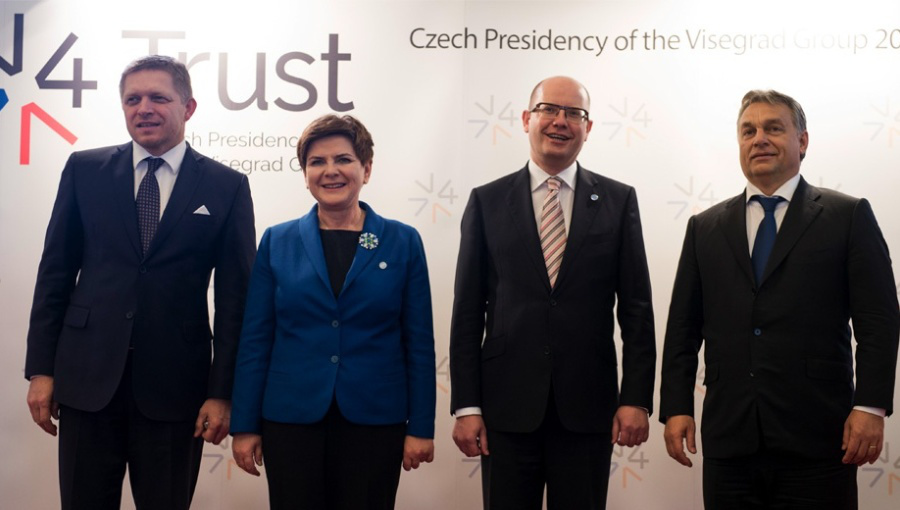
The Visegrád group is a cultural and political union of 4 countries: The Czech Republic, Hungary, Poland and Slovakia. All those countries are located in the Central European region and it is exactly this geographic character that gave them a « single civilisation sharing cultural and intellectual values and common roots in diverse religious traditions, which they wish to preserve and further strengthen. »
However, the Visegrád group – or V4 – was never created to be an alternative structure or political organisation, but rather because the countries in question have the same views and wish to reach similar goals with a common agenda.
The V4 cooperation is characterised by a partnership at all levels: meetings are held between ministers of the four countries but also between NGOs, think tanks and research bodies. Indeed, joint projects are implemented in different fields. Students can, for example, appeal to a study program which offers the possibility to study in those 4 countries.
Created in 1991, during a conference between the 3 countries (Slovakia and Czech Republic being at the time the Czechoslovak Republic), this Union took the name of the place of this conference: the city of Visegrád in Hungary. The aim has been clear since the beginning of the cooperation: to eliminate the remnants of the Communist bloc in Central Europe and to accomplish the necessary transformation to furthering the European integration and finally obtain the EU membership as well as the NATO one.
In the scope of this European integration, the V4 countries take on its full meaning. All those Central European countries share the desire to join the European Union and in this way, they help each other on this movement towards membership. We can see that by the fact that the V4 accessed the EU membership together at the same time on May the 1st 2004.
Once the goal – a EU and NATO membership – had been reached, the Visegrád group did not disappear, as it was and still is also a way for those 4 countries (which are now all member of the European Union) to have a bigger voice by cumulating their strengths. In fact, it is usual to see declarations directly from the V4 in a specific issue; those countries learned to express a unique voice from time to time, as was shown during the migration crisis.
However, this latter example demonstrated that the V4 voice, once pro-integration, became illiberal. It seems that the four countries have the strongest position on anti-immigration, as was indicated by the will to not welcome refugees.
What changed is that populist politicians are at the head of those countries. Whilst the conservative Viktor Orbán has been Prime Minister of Hungary since 2010, Poland joined this trend by electing the right-wing Law and Justice party (PiS) in 2015. Slovakia and the Czech Republic are less affected by this populist trend, although they likewise rejected the application of refugee quotas, as was voted for in the Council. The rejection of the quotas eventually led to an infringement procedure against Poland, Hungary and the Czech Republic. This populism and their actions have increased Euro-scepticism in those countries, as well as a decreased affection for the European Union; The Visegrád group is in turns to change its reputation in the international relation from which it could be difficult to return.
Last year, on February 15, the V4 celebrated its 25 years of existence. Prime ministers of the 4 countries met to exchange their views, and the chosen subjects were not innocent: the migration crisis and the cooperation with the Balkans countries.
It is true that if there is one subject to retain about the actual V4: the cooperation on defence and the improvement of security in Central and Eastern Europe. It was already seen as a duty during the Orange revolution in Ukraine, and it is also legitimate during the Balkan countries negotiation about the access to the European Union. Indeed, the Visegrád group have a key role to play due to its relation with the Balkans and their geographic proximity. Despite the tendency to reject Europe, combined with a growing sense of nationalism, the European Union will have to deal with the V4 to fulfill its promises towards the Balkan countries.
Aurélien Pommier, EST Ambassador to Poland, graduated from the University of Lorraine (France) in Law and in Economics. He is currently studying European Politics at the Jagiellonian University.

 The ’Ndrangheta’s Infiltration and Threat to European Institutions
The ’Ndrangheta’s Infiltration and Threat to European Institutions  From Paper to Practice: How Grassroots Norms Undermine Gender Rights in Pakistan
From Paper to Practice: How Grassroots Norms Undermine Gender Rights in Pakistan  Exploited Childhoods: The Role of Global Corporations in Perpetuating and Mitigating Child Labour
Exploited Childhoods: The Role of Global Corporations in Perpetuating and Mitigating Child Labour  Human Rights Challenges in Addressing SLAPPs in Media, NGOs and Journalism in the EU
Human Rights Challenges in Addressing SLAPPs in Media, NGOs and Journalism in the EU 


